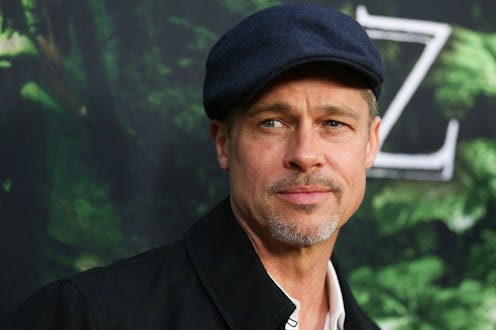
A divorce is always devastating, but positive learning and insight can come out of it if you're ready to put the work in, and Brad Pitt's endorsement of therapy in his GQ interview suggests to me that he's more than ready to do that work. I'm personally a huge fan of therapy, for anyone and everyone who's lucky enough to have access to it, but my perspective doesn't necessarily account for the way it's perceived as a whole. Somehow, even in 2017, there can still be some stigma associated with talking about your feelings and asking a trained professional for help sorting through them, beneficial as is.
But, to his credit, Pitt shrugs off that stigma, revealing early on in the interview that beginning therapy is one of the most important changes he's made since the announcement of his divorce from Angelina Jolie. He said,
"You know, I just started therapy. I love it, I love it. I went through two therapists to get to the right one."
It's a simple statement, but a powerful one, because it simultaneously acknowledges his belief in this new system of treatment that he's begun, and the fact that it's important to find the right fit for yourself. It isn't a matter of just picking a name out of the phone book and showing up so you can say you did; it's about digging deep and asking the real questions, starting with, "is this the right therapist for me? What can I get out of this?"
It's a perspective that it seems like Pitt is attempting to apply to his entire life now, judging by the article. He says that he thinks this moment in his life "would have come knocking, no matter what," regardless of the divorce, and this is how he describes the sensations of moving through one of his lowest points:
"I do remember a few spots along the road where I've become absolutely tired of myself. And this is a big one. These moments have always been a huge generator for change. And I'm quite grateful for it. "
Pitt shares that he's quit drinking since the split, revealing that he felt like he was using it as a crutch to avoid dealing with his feelings, and the self-awareness doesn't stop there:
"I mean I stopped everything except boozing when I started my family. But even this last year, you know — things I wasn't dealing with. I was boozing too much. It's just become a problem. And I'm really happy it's been half a year now, which is bittersweet, but I've got my feelings in my fingertips again. I think that's part of the human challenge: You either deny them all of your life or you answer them and evolve."
That last line is so powerful to me. When bad things happen to you, or your own actions cause negativity in your life, there are two ways of dealing with them. One is to get angry or to give up; to allow those obstacles to halt you in your tracks, and become crippled by a spiral of self-doubt. The other is to push through them, feeling the feelings and enduring the pain, and to come through on the other side a stronger person, and it's clear which route Pitt has chosen.
He continued,
"The avoidance of pain is a real mistake. It's the real missing out on life. It's those very things that shape us, those very things that offer growth, that make the world a better place, oddly enough, ironically. That make us better."
I really can't say enough how much I appreciate Pitt's perspective on all of this. Probably the best and most important part of the interview for me, and the one that I hope readers take inspiration from in their own lives, is the fact that he doesn't beat himself up for it taking him until age 53 to find his way to therapy and introspection. He explains the way he grew up, and the beliefs it left him with, and seems serene in the knowledge that life is a journey, and there's no reason to punish yourself for where you are in that journey:
"I come from a place where, you know, it's strength if we get a bruise or cut or ailment we don't discuss it, we just deal with it. We just go on. The downside of that is it's the same with our emotion. I'm personally very retarded when it comes to taking inventory of my emotions. I'm much better at covering up. I grew up with a Father-knows-best/war mentality — the father is all-powerful, super strong — instead of really knowing the man and his own self-doubt and struggles."
I just really love the full-throated endorsement of therapy from one of the most visible A-Listers in Hollywood. Brad Pitt doesn't owe any of us an explanation of where he is in his journey of self-awareness, so the fact that he's letting us in to such an intimate moment is quite generous. If it encourages just one person to do some self-examination or to ask for outside help with a problem, then that will have been more silver lining on the cloud of the Jolie-Pitt divorce than I could ever have imagined.